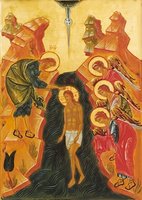The Power of the Cross by Michael Dubruiel is available in a free e-book version today.
Lent begins on Ash Wednesday, February 18.
The Cross of Christ Transforms. . . Our Lives
Lukewarm Faith
I visited the ruins of Laodicea in 1979 while I was serving in Turkey as a member of the United States Army. Of all the seven churches mentioned in Revelation, the ruins of this city were the most desolate. It was destroyed late in the fifth century AD by a terrible earthquake. My memory is of a wide-open field, with an amphitheater and some graves nearby. In the Book of Revelation, Jesus warns the apathetic Church of Laodicea: “I know your works: . . . because you are lukewarm, and neither cold nor hot, I will spew you out of my mouth. For you say, I am rich, I have prospered, and I need nothing; not knowing that you are wretched, pitiable, poor, blind, and naked. Therefore I counsel you to buy from me gold refined by fire, that you may be rich, and white garments to clothe you and to keep the shame of your nakedness from being seen, and salve to anoint your eyes, that you may see. Those whom I love, I reprove and chasten; so be zealous and repent” (Revelation 3:15–19).
Archbishop Fulton J. Sheen, perhaps the greatest American Catholic preacher of the last century, used to say that these words were addressed especially to those of us who live in the northern hemisphere. When I look at the cross of Christ, I realize he’s right: The cross speaks of radical commitment; mine is only lukewarm by comparison. I often harbor thoughts about grasping at things of the world that might offer some guarantee against whatever impending doom lies in the future.
Who You Gonna Call?
I think it is understandable. We live in a consumer society that constantly tries to sell us a slice of heaven: “enough” life insurance, in case you should die suddenly; a “big enough” plot, so that your loved ones will be able to find you; the “right” drug to help you get more out of sex, enhance your mood, keep your kids in line; the list goes on and on. But in the end, will any of these enticing offers truly save us? Of course not. The cross of Christ forces us to choose sides, to reorder our priorities. It also transforms our personal crosses and gives us hope: We have on our side someone who is victorious over all enemies, all powers and principalities. St. Leonard said, “Impress on yourself this great truth: Even if all hell’s devils come after you to tempt you, you won’t sin unless you want to—provided that you don’t trust in your own powers, but in the assistance of God. He doesn’t refuse help to those who ask it with a lively faith.” God offers us all the help we need in this life, if we avail ourselves of it. As the catchy title tune of the movie Ghostbusters asks us: “Who ya gonna call?”
--an excerpt from
The Power of the Cross by Michael Dubruiel is a book well-suited to daily reading during Lent.
 The First Luminous Mystery: The Baptism of the Lord
The First Luminous Mystery: The Baptism of the Lord













